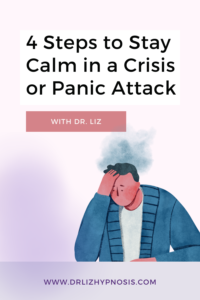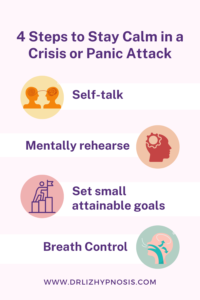4 Steps to Stay Calm in a Crisis or Panic Attack
Transcript
I was going through some old files and notes and ran across a story that I would like to share with you about how important self-talk is, as well as breathing and training yourself how to react under difficult circumstances.
So, to become a Navy SEAL, there’s this one period called “hell week,” which breaks a lot of potential candidates. They don’t make it through a whole week, and it’s really important because what they do is like a practice assault on the breathing in a pool of water. When your body is faced with a lack of oxygen, like when you’re in a panic attack, and the inability to breathe, it shoves it into this whole other physiological reaction that’s triggered in the brain. A whole host of biochemical stuff happens, and honestly, sheer panic usually takes over. That’s a normal reaction of the body.
So what the US government did is they studied the effects of Hell Week, and scientists found that there were four tools that helped people through Hell Week, helped the candidates pass Hell Week, and actually become Navy Seals.
If you don’t know what Navy Seals are in the US, or part of the Special Forces like Elite Training, you gotta go through all this stuff to be able to do it. It’s not just like the regular military that someone can sign up for.

First Tool – Self-Talk
So, there are four tools. The first tool was self-talk. If you’re able to maintain clear, positive, and careful directions to yourself during a difficult time, it’s going to help you. You need to be your own coach, so this is not putting yourself down, especially building yourself up, telling yourself to hang in there.
I’m saying all kinds of positive stuff about yourself like you can do this, and you can do this in a very gentle voice if you like. There’s a famous, I think he went through Navy Seals week or may be a marine, David Goggins. He writes a lot of books, and he’s on podcasts and stuff, and he has the worst self-talk I’ve ever met. I mean, I’ve never met him, but he’s awful. He yells at himself basically, and you can imagine he shares in this book that he had an extremely violent abusive childhood, so he learned this super-critical, abusive voice.
You don’t have to use that one, okay, but honestly, that voice helped him achieve incredible things in his life.
As a therapist, I don’t exactly recommend a harsh, critical voice. I recommend you can use a gentle, positive voice or a firm positive voice, but the important thing is that you have this positive self-talk that keeps you going like you can do this, all right?
Second Tool – Mentally Rehearse
Number two, mentally rehearse or practice while maintaining a positive emotional outlook. So this prepares your nervous system to be calm when you rehearse and practice while being positive. It actually prepares yourself to do that in the future when a crisis arises.
Tool Three – Small Attainable Goals
Three, set small attainable goals to measure your success and pace yourself through the movement. So this is really interesting. I’ve heard this in all kinds of high-achieving physical feats that the smaller you could break it down, the better. So like “Oh, I’m just gonna run another 10 steps. I can make it through 10 steps and talk to yourself like that, or I can make it like two seconds more.” That’s all I need, two seconds more to break it down really small.
Tool Four – Breath Control
Four, gain control over your state of arousal through breath control. You heard it here, it is through breath control, and I do so much breathing in my practice, I have videos on breathing but you can search them up very easily there are all kinds of breathing, there’s a”
- Box breathing which is one – two – three – four
- Inhale to 4 pause, Exhale to 8
- Counting your breaths to 21 which is a Buddhist technique
Then if you get distracted somewhere in there you start over all of those count. But the more you practice breath control, the better it is for your nervous system to remain calm and also the better it is for your nervous system in a crisis that perhaps you find yourself in one day.
Let’s say the better it is for your anxiety or to prevent a panic attack or to help you handle a panic attack.

So I am an anxiety specialist and breathing is in every single book I’ve ever read about how to treat anxiety in panic disorder, panic attacks, as well as as you do it in your practice. I teach it all the time and you know I run into people all the time who say like “Oh I can’t meditate or forget meditation. I tried, I can’t do it” and I say you don’t have to meditate. You really don’t but let’s just try a very simple breath here – A four eight or a one two three four that’s it. That’s all we’re doing, we’re just trying a simple breath because that’s going to help you prevent as well as down the road if you’re in a situation where you feel the anxiety rising or a panic attack hits you out of the blue. All right people I hope that is helpful for you.
Before you go, remember to get your Free Hypnosis to reduce Fear and Anxiety!
I work with people all over the world. If you want to feel better and have a transformed life, grab your Free Consultation with me to get the deets on working together (the how, the when, the where, and the how much)!
Click to Schedule a Free Consultation
Peace and Health,
Dr. Liz







